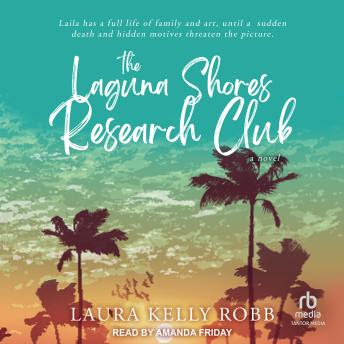The Audiobook Experience
Like nearly every writer I know, I proof my manuscripts by reading them out loud. With my finger poised over the delete button, I find unnecessary words that make a sentence sticky and verb tenses that don’t line up. The process turns up lines of dialogue that sound stilted, as well as gaps in meaning—those leaps in logic a reader would be unable to make without additional information.
My latest mystery, The Laguna Shores Research Club, published by TouchPoint Press in 2022, underwent the same process. The trade paperback version, further copyedited by editor Kimberly Coghlan, was praised for the readability of the prose. I was delighted when TouchPoint sold the audio rights to Tantor Media. The audiobook became available November 2023.
Listening to the audiobook taught me a few things about my editing process. Something happens when one’s writing becomes performed sound. The story gets a new layer. All the characters gain an additional aspect through the voice the narrator chooses for each one. For instance, the character of the deceased friend, Billie, acquired a West Virginia accent, done very well by the narrator, Amanda Friday. I had written Billie as having a slight drawl, but I meant only to alert the reader to the fact that she wasn’t a native of Washington, D.C. In Amanda’s narration, however, Billie’s soft, slow pronunciation serves to make her more vulnerable. When I first heard the full recording, Billie’s demise struck me as more tragic than in the written version.
During the process of proofing the manuscript out loud, I had not considered what a performer might add. Knowing what I know now, my instinct will be to give a potential audiobook creator more material to work with—more accents, more quirks of speech, or more variations of disposition that bubble up into the dialogue.
Another benefit that a recording can wring from the written word is to highlight the pacing. Feedback I received from some listeners pointed out that the plot began to gallop in the last quarter of the book and the ending left them breathless. Amanda anticipated the change in the rhythm of the story by speaking in the early chapters in a measured tone. She saved her variations in intonation for the critical plot developments and final revelations. If I had realized the effect her techniques could have, I think I would have begun the suspense earlier in the book by spreading out the revelations and suspicions of the main character. I’ll be more likely in the future to take the listener as well as the reader into consideration as I structure a plot.
I found one downside to a vocal performance to be the treatment of the dialogue tags. Since we generally read faster than we listen, some repetition in a text is glossed over by the efficient reader. I often included dialogue tags for clarity on the assumption a few extra tags would not tire out most readers. In the audio, however, unnecessary repetitions can weigh down the performance. The narrator often indicates who is speaking through variations in tone and pitch, and the “he said” and “she said” tags become tiresome. In future work, I will be more attuned to the tags and try to edit them more closely.
As audiobooks become more popular, writers may want to consider producing their own audio versions of their work. I am not familiar with the best ways to proceed, but I know more and more people are wading in. If you are interested, here’s my Mystery and Suspense magazine interview with Amanda Friday about the ins and outs of narration and her work with indie authors.
The Laguna Shores Research Club by Laura Kelly Robb
(ISBN 9781956851311; 328 pp, trade paperback)
Laila Harrow knows the best way to track down anything—or anybody—is to ask Billie Farmer. As the brains of the Laguna Shores Research Club, Billie teaches fellow members how to reach into the ether and pluck out facts.
Counting on Billie’s guidance, Laila promises the St. Augustine Museum a catalogue of Florida Highwaymen paintings that will catapult her standing in the art world. But when Billie dies suddenly, Laila is forced to pull herself out of the darkness and follow the facts. Her investigation turns up up one fact too many: Laila is at the center of a dangerous game.
You can find the audiobook of The Laguna Shores Research Club on Audiobooks.com, AudiobooksNow.com, GooglePlay, LibroFM.com, the free site that asks listeners to post reviews, AudioFreebies.com,and Audible, as well as other platforms such as Spotify. If you have time to take a listen, I would love to hear your thoughts. Reach me at Laura@LauraKellyRobb.com
After studying at the University of Toronto, Laura taught for five years in Spain. Returning to Seattle, she completed a three-week fiction class at Iowa Writers’ Workshop, and published short stories for Foliate Oak, The Nassau Review, and on the RTVE show, Nómadas. She is a member of the Mystery Writers of America. The Laguna Shores Research Club is her second novel.
Social Media Links
Website: https://www.laurakellyrobb.com/
X: @LauraKellyRobb
Instagram: @BookHardy




I find when I listen to the chapters my narrators send me, I tend to want the inflection of how I perceive my character to say something and my narrator doesn’t always give me that. Then I have to decide how important it is for a sentence to be said, how I think it should be said and how the narrator portrays it. Thanks for being a guest!
LikeLike